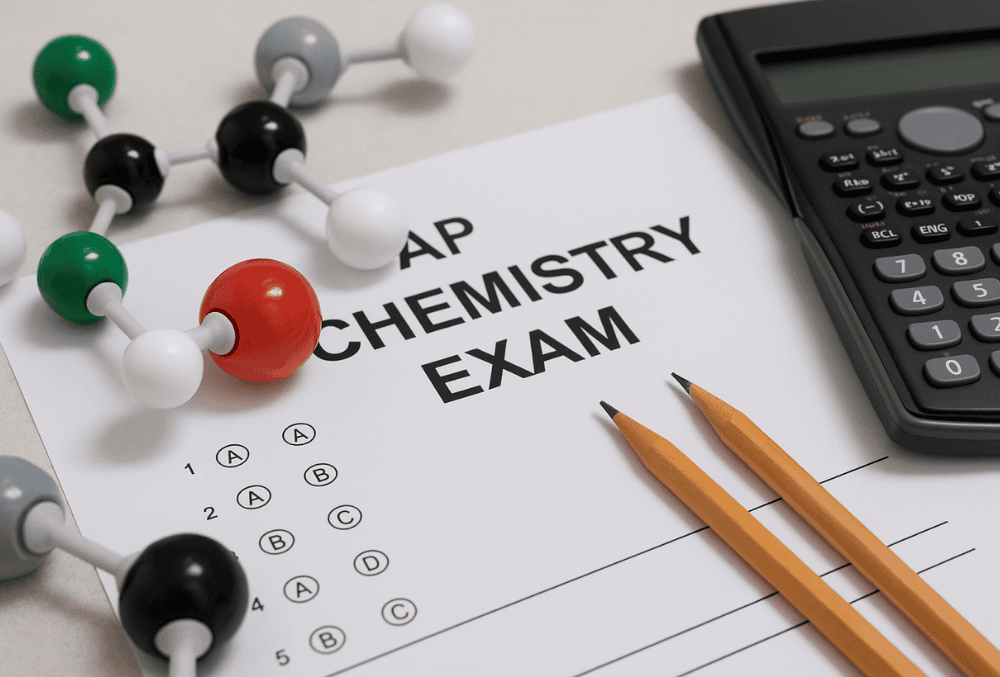If you’re preparing for the AP Chemistry exam in 2025, one of the most important things to understand is how the scoring works. Many students focus only on studying content but overlook the importance of knowing how many multiple-choice questions (MCQs) and free-response questions (FRQs) they actually need to get right.
This blog will break down the AP Chemistry scoring system, help you understand what scores you need to pass, and give you realistic goals if you’re aiming for a 3, 4, or 5. Whether you’re studying on your own or working with an AP Chemistry tutor, this guide will help you plan smarter.
Overview of the AP Chemistry Exam Format
The AP Chemistry exam is split into two equal parts: multiple-choice and free-response.
Section I: Multiple Choice (MCQs)
- 60 questions
- 90 minutes
- 50% of the total score
- No penalty for incorrect answers
Section II: Free Response (FRQs)
- 7 questions (3 long, 4 short)
- 105 minutes
- 50% of the total score
Both sections are equally important. A strong performance in one section can slightly balance out the other, but you need a solid performance in both to secure a higher score.
How the Scoring Works
Each correct answer in the MCQ section earns 1 raw point, with a maximum of 60 points. There is no deduction for wrong answers, so it’s in your best interest to answer every question.
The FRQ section is graded manually by AP readers using a rubric. Each question has multiple parts, and partial credit is awarded. Your total FRQ raw score usually ranges from 46 to 54 points depending on the year.
After the exam, your combined raw score from both sections is converted into a final score between 1 and 5 using a scale set by the College Board. This scale may shift slightly each year depending on exam difficulty, but general trends stay consistent.
What Score Do You Need to Pass or Get a 5?
Here’s a realistic breakdown of how many correct answers you should aim for:
-
Score of 5 (Highly Qualified): You’ll typically need around 70–80% of the total points. That means getting approximately 45–48 MCQs correct and scoring 35–40 points on the FRQs.
- Score of 4 (Well Qualified): You’ll need about 60–69% overall. That’s around 36–41 correct MCQs and 30–34 points in the FRQs.
- Score of 3 (Qualified/Pass): This usually requires around 50–59% total. You should aim for 30–35 correct MCQs and at least 25–29 points in the FRQ section.
While these aren’t exact cutoffs, they’re close estimates based on past scoring trends released by the College Board.
How Many Questions Should You Get Right?
This is one of the most common questions students ask. Here’s what you should target:
- If you want a 5, aim to get at least 45 MCQs correct and 35+ points in FRQs.
- For a 4, try to get around 38–40 MCQs and 30–34 FRQ points.
- If you’re aiming for a 3, focus on getting 30–35 MCQs right and scoring at least 25 in the FRQ section.
Remember, no single question decides your fate. It’s your total performance that counts.
Tips to Improve Your AP Chemistry Score
Understanding the exam is just the first step. To improve your actual score, follow these preparation tips:
- Practice Real AP MCQs Daily – Use released questions from previous exams to understand patterns and question styles.
- Break Down FRQs and Practice Writing Answers – Focus especially on equilibrium, kinetics, and acid-base problems.
- Use Timed Practice Tests – Simulate the test environment to build your time management and endurance.
- Review Mistakes Deeply – Don’t just check the right answers—understand why you were wrong and how to fix it.
- Get One-on-One Help from a Qualified Tutor – A good AP Chemistry tutor can help you focus on weak areas, explain concepts clearly, and guide you with exam strategy.
At Bright Mind Tutors, we work with high school students across the USA preparing for AP-level exams. If you’re struggling with MCQs, formulas, lab-based questions, or just need a structured study plan, our tutors can help.
Why Does Understanding the Scoring Matter?
A lot of students study for hours but still don’t know what score they’re actually aiming for. When you understand how many questions you need to get right, you stop wasting time on low-impact material and focus more effectively. That’s how top scorers prepare—and it’s how you should too.
Whether you’re preparing during the school year or over the summer, it’s never too early to build a solid foundation in AP Chemistry.
Get Help from Expert Tutors at Bright Mind Tutors
If you’re preparing for AP Chemistry and want to boost your score, we’re here to help. Our tutors break down difficult concepts, help with tricky FRQs, and make sure you’re confident for test day.
Start your journey toward a 4 or 5 with a trusted AP Chemistry tutor from Bright Mind Tutors.
Have questions or want to discuss your prep plan?
Contact Us now and take the first step toward a higher AP Chemistry score.




